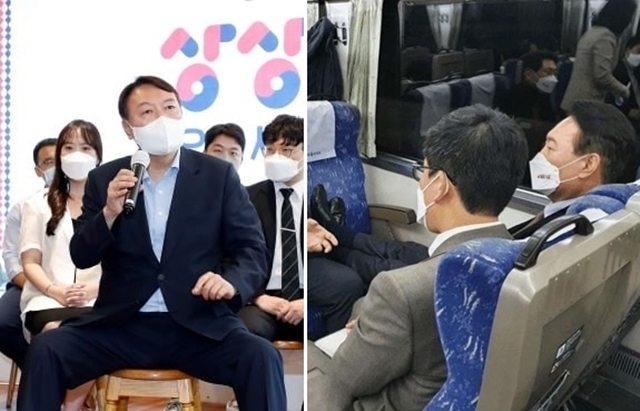 |
Photos show presidential candidate Yoon Suk-yeol ‘manspreading’ and putting his feet on a train seat rented by his campaign team. (Yonhap, Lee Sang-il’s Facebook) |
*진행자: 최정윤, Beth Eunhee Hong
1. Yoon once again haunted by ‘kkondae’ image요약: 윤석열 국민의힘 대선 후보가 홍보 열차 안에서 구두를 신은 채 맞은편 의자에 두 발을 올려놓은 사진이 논란이 되면서 ‘꼰대’ 이미지 비판을 피하지 못했다.
[1] Presidential candidate Yoon Suk-yeol of the main opposition People Power Party came under fire earlier this week after a picture of him putting his feet on a train seat went viral. The photo, uploaded on social media by his aide Lee Sang-il, showed Yoon’s legs all stretched out with his feet on the seat opposite of him with his shoes on. The train was chartered by his party as part of his presidential campaign.
*come under fire: 맹비난[비판]을 받다
*charter: (항공기나 배를) 전세 내다 / charter flight: 전세기 [2] His show of poor etiquette saw critics slam him as a “kkondae,” a term that refers to a condescending older person in Korean. It is not the first time Yoon’s manners, or lack thereof, have made headlines.
*slam: 비난하다/ 쾅 닫다
*condescending: 거들먹거리다, 잘난 체하다*thereof: (앞에 언급된) 그것의 <부사>[3] Last year, Yoon came under fire after being pictured ”manspreading“ on multiple occasions. Manspreading is defined as “the act or practice by a man of sitting with the legs spread wide apart (as in a public seating area) in a way that intrudes on the space of others,“ according to the Merriam-Webster dictionary.
*manspread: 다리를 벌리다/ 쩍벌남
*intrude: 방해하다, 침범하다 [4] Though these instances of poor manners may seem innocuous on first glance, the act of sitting with one’s legs wide apart, or putting one’s feet on a seat on public transportation are linked with being “condescending” or even authoritarian.
*innocuous: 악의 없는, 무해한
*authoritarian: 권위주의적인기사 원문:
http://www.koreaherald.com/view.php?ud=20220217000782&ACE_SEARCH=12. From study cafes to ride-sharing, Koreans seem to prefer same-sex environments. Why?요약: 한국인이 동성 환경을 더 선호하는 특별한 이유가 있다?
[1] From study rooms to gosiwon, tiny housing cubicles available for rent, separating people by sex is widely accepted as a norm. Seoul’s latest move to allow taxi ride-sharing also attests to the popular guide of separating people by gender, making the service available only among same-sex users.
*norm: 표준, 기준, 일반적인 것
*attest: 증명하다
[2] An advocate of this segregation policy, at least at study cafes, is Kim Si-song, a 28-year-old woman preparing for a state-run teacher employment exam. “I used to go to a study cafe where men and women study in the same place, and there was one time when a female customer accused some men of secretly taking pictures of young female students,” she said. It is not that all men are potential peeping toms, but she now prefers to go to study cafes that have a separate spaces for women only, to be free of any unnecessary worries, Kim said.
*advocate: 옹호자/ 지지하다
*segregation: 구분, 분리
*peeping tom: 엿보기 좋아하는 사람, 관음증 환자[3] Often, worries over voyeurism, harassment and other sexually-motivated crimes are the reasons behind gender segregation in public spaces or business establishments.
*voyeurism: 관음증
*harassment: 괴롭힘, 성희롱[4] Separating men and women may be an easy way to address concerns over sex crimes, but it runs the risk of being an excessive restriction that removes any benefits of a gender mix, some say. A recent Supreme Court ruling has found a legal mandate on separation of men and women at private reading room facilities to be an excessive measure that infringes upon people’s right of self-determination.
*address: (문제를) 다루다, 처리하다/ 우편물을 보내다
*mandate: 율령/ 권한
*infringe: 위반하다, (법적 권리를) 침해하다
*self-determination: 자기 결정 권력기사 원문:
http://www.koreaherald.com/view.php?ud=20220218000624By Korea Herald (
khnews@heraldcorp.com)






![[Out of the Shadows] Seoul room clubs offer drugs to compete for clientele](http://res.heraldm.com/phpwas/restmb_idxmake.php?idx=644&simg=/content/image/2024/11/05/20241105050566_0.jpg)

